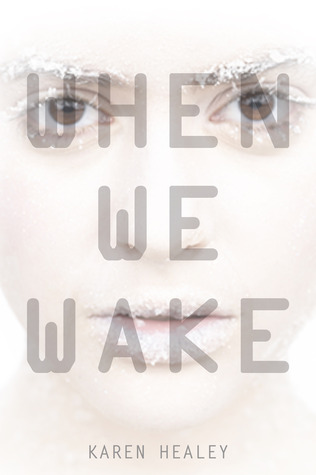 When We Wake by Karen Healey
When We Wake by Karen Healey
Book stats:
Reading level: Young Adult
Hardcover: 296 pages
Genre: Science Fiction
Publisher: Little, Brown Books
Release date: March 5, 2013
Series: When We Wake #1
Source: Borrowed
Reviewed by: Helen
Purchase: Amazon | Book Depository
Sixteen-year-old Tegan is just like every other girl living in 2027—she's happiest when playing the guitar, she's falling in love for the first time, and she's joining her friends to protest the wrongs of the world: environmental collapse, social discrimination, and political injustice.
But on what should have been the best day of Tegan's life, she dies—and wakes up a hundred years later, locked in a government facility with no idea what happened.
The future isn't all she had hoped it would be, and when appalling secrets come to light, Tegan must make a choice: Does she keep her head down and survive, or fight for a better world?
There was a real missed opportunity for some imaginative world-building in When We Wake. Though Tegan wakes up just over 100 years into the future, we don't find out very much about the world and how it now works. We get thrown little bits of slang, and little anecdotes from Tegan herself as she tries to navigate this world, but we really get let down as far as being able to see the world from a bird's eye view.
For a novel that barely gave much information about the future world that I'd actually be interested in, there were definitely quite a few political and social agendas thrown in rather heavy-handedly. Without the rounding out of an entire world building experience, these points seemed clunky at times. Overall, I agree with the message of social change that the characters advocated for. But in order to truly get a message as important as social change across, it really should be weaved into the story in such a way that the reader isn't constantly aware of it. The social, religious, and political agendas within When We Wake were awkward and forceful where they should have been insightful and inspiring.
At first, Tegan believes that they have started this revival program as a way for the government to revive soldiers. And since Tegan's father was a fallen soldier, she immediately jumps on board whole-heartedly. I understand how her father's death might make her more willing to cooperate, but I was still surprised at just how quickly she seemed to jump head first into the whole charade.
The writing style in When We Wake is risky - as it breaks the fourth wall. Meaning the narrator speaks directly to the reader - there are times when Tegen addresses the reader as she retells her story. I've read novels where this sort of writing style was incredible and literally dragged the reader into the story directly. Unfortunately, Tegan's direct conversations with the reader were more irritating than anything. They didn't actually serve much purpose at all to the story itself, and seemed almost to have been taken as a shortcut for not having to really introduce the reader to Tegan herself.
For a book with such a promising and original concept, I felt extremely let down. Maybe my expectations were set too high for this one, but I don't think I'll be continuing on with this series.













Too bad, this book sounds like it has so much potential. The trailer looks good too, but maybe I'll skip it and come back to it after I get through my TBR pile(which won't be anytime soon).
ReplyDelete